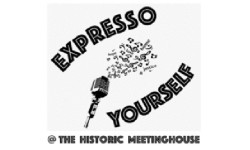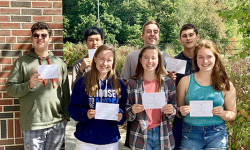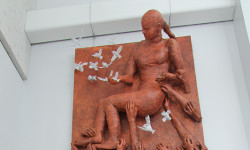By Gail-Agnes Musikavanhu
Hometown Weekly Correspondent
Fifty-six years after Sylvia Plath's death on February 11, 1963, the town of Wellesley and its citizens have a number of initiatives underway to finally formally recognize the town's most famous resident.
The Historical Commission, which erects plaques on homes built before 1919, is beginning a process of erecting virtual and actual plaques on buildings of historical importance. The Commission is also considering plaques that allow for greater historical detail on the homes of historically important Wellesley residents like Plath - plaques similar to those found in Charleston, Trenton, Cambridge, and Newburyport. There is a plaque on Plath’s former home in London.
Plath’s childhood home at 26 Elmwood Road is already one of four houses classified as Historic Districts in Wellesley. Despite this recognition and public knowledge, it has not yet been honored with a plaque as Plath’s former home in London has been.
The Historical Commission, which was supportive of the decision to include the building as a Historic District when the decision was made, is equally as supportive of the current initiatives to further commemorate the notable figure in Wellesley’s history.
Chairman Grant Brown has disclosed that the next steps would be to create the informational text for the plaque, and from there decide which plaques to produce.
“I believe that Ms. Plath’s home is in the process of being sold right now, so we’d want to share that information with the current or new homeowner. If they had an interest in installing a physical plaque, then we would help them with the construction of that.”
In addition to these efforts by the Commission, Wellesley resident, author and writing teacher Charlene Smith has asked the town to name a street and square after Plath. Currently, there is only one commemoration of Plath in Wellesley: a small plaque erected by her former classmates outside of the W. Crockett Library at Plath’s alma mater, Wellesley High School.
At the high school, which celebrates its 150th anniversary in June, former English department teacher Jeanie Goddard is volunteering days of her retirement to create an archive for the school. Her work has uncovered important memorabilia of Plath and her mentor and teacher, Wilbury Crockett, after whom the library is named.
Goddard has come across old school newspapers with articles written by Plath, as well as copies of her poems with Crockett’s teaching notes on them. The boxes are currently in a back room of the library and she is not sure where they will ultimately be displayed.
Smith’s request for a street name and square was read to the Wellesley Advisory Committee meeting a couple of weeks ago, and Chairman Jack Morgan has said that the Selectmen would consider the matter after the town meeting and budget in late March.
Both Wellesley and the Poets’ Corner section of Wellesley have streets named after British and American male poets while ignoring Wellesley’s Pulitzer Prize winning poets, Plath and Anne Sexton. The Poetry Foundation has named Plath one of the best-known female poets of the 20th century and the Academy of American poets considers her one of ten female writers who shaped American poetry.
























